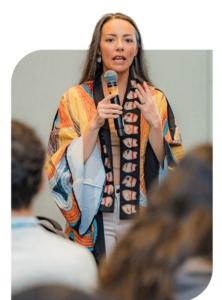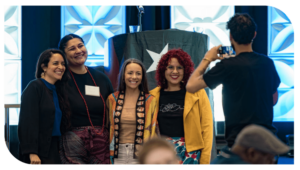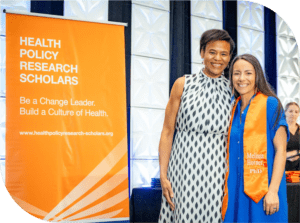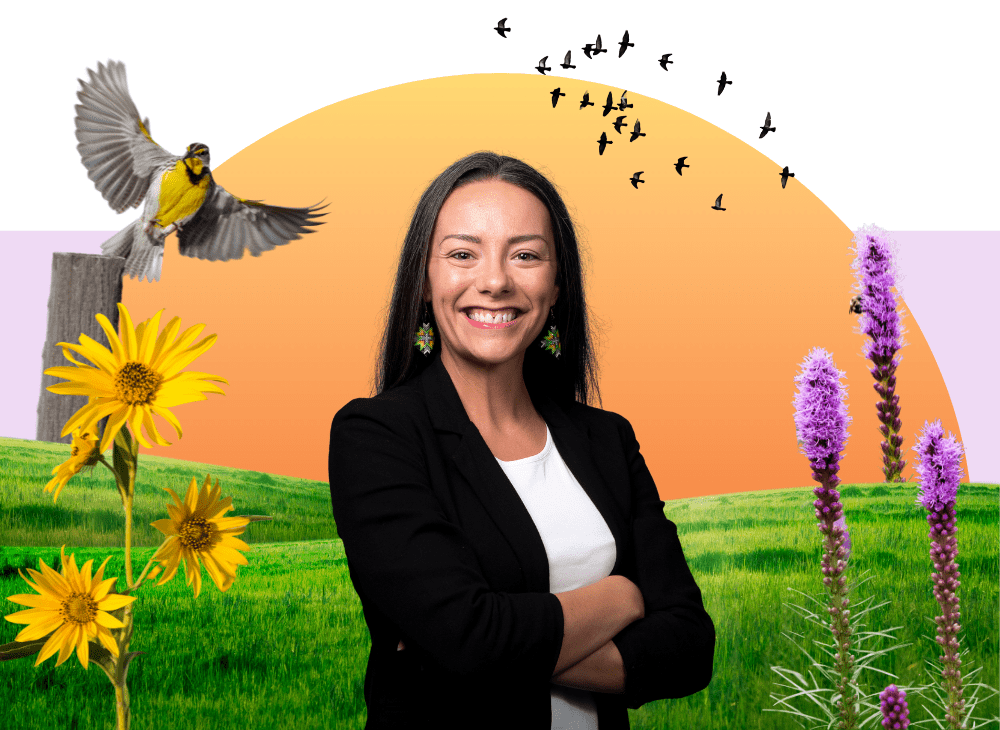Melissa Horner (Manitoba Métis Federation/Turtle Mountain Band of Chippewa), is a PhD candidate in sociology at the University of Missouri, and a Health Policy Research Scholar. Her work seeks to illuminate the ongoing impacts of U.S. settler colonialism while championing the knowledge and futures of Native Peoples.
Melissa’s path to academia was not linear. Before entering her PhD program, she spent over a decade bartending and teaching high school in rural Montana, both of which shaped her perspectives on education and colonialism.
“At one point, it became hard to teach about the concepts I wanted to in the forum I was in,” she reflects. This realization led her to pursue a PhD in sociology, a discipline she chose because of its ability to critique systems rather than individuals and explore colonialism’s structural impacts on Native communities.
“Colonialism has always affected my life, family, and community,” Melissa explains. “I wanted to explore what happened, why that happened, and figure out ways to counteract that.”
Ongoing U.S. Settler Colonialism & Native Peoples Teach-Out
Last year, Melissa applied for and received the HPRS Teach-Out Award to develop an online learning experience that tackles ongoing U.S. settler colonialism head-on.
A Teach-Out is a free online course that engages learners on a particular topic and supports them to take action to advance the topic in their community. It is considered less academic and more accessible than a traditional classroom environment.
Melissa’s Teach-Out, “Ongoing U.S. Settler Colonialism & Native Peoples,” offers an opportunity for a wide audience to confront the ongoing realities of settler colonialism while engaging with Indigenous perspectives, histories, and knowledge systems.
As Melissa puts it, “Our sovereignty is land-based knowledge. It transcends the laws that [the United States] has come up with in just the past few hundred years. Our work is to use our teachings to carry out responsibilities for that place. It’s our responsibility to be supportive and affirming of others. It’s our job to show up for each other.”
A Framework for Action
The Teach-Out’s seven modules explore how settler colonialism manifests across sectors such as health, education, law, food systems, and media while envisioning anti-colonial futures. With over ten hours of content, including lectures, discussions, artwork, readings, and activities, it provides a framework for recognizing settler colonialism as a pervasive social structure and invites learners to co-create thriving futures grounded in Indigenous knowledge and collaboration.

Melissa Horner at Summer Institute in Baltimore.
Melissa’s approach reflects a shift toward what the Robert Wood Johnson Foundation calls “Community Power” narratives. These narratives emphasize agency and systemic change led by those most impacted. They also center on the value of lived experience and cultural knowledge—the Teach-Out counters harmful narratives of victimhood or paternalism by highlighting the power and resourcefulness of Indigenous communities.
Designed for Native and non-Native audiences, the Teach-Out is a call to action for anyone eager to engage with the United States’ ongoing settler colonial dynamics and building a more equitable society — including educators, researchers, artists, policymakers, healthcare professionals, community organizers.
Creating Space for Reflection and Connection
Throughout the Teach-Out, Melissa encourages participants to engage critically with their own positionalities and to ask hard questions about the structures that define their everyday realities. The course highlights four cornerstones of ongoing settler colonialism: 1) the elimination of Indigenous Peoples, 2) the imposition of property, 3) the production of anti-relationality, and 4) the naturalization of limited options. These cornerstones serve as a foundation for understanding how colonial structures persist in shaping U.S. society today.
But Melissa’s goal is not just to inform—it’s to connect. “It’s been an interesting, high number of people who’ve participated in the Teach-Out, and I’ve had a dozen or so people reach out to make more connections, telling me about a resource that really helped them and asking to partner on other projects,” she shares. “That’s all I want when I do this work: to connect with people and engage in things that are shared common work.”
Melissa’s Path to HPRS

From left to right are HPRS scholars Carol E. Ramos-Gerena, Sione Lynn Pili Lister, Melissa Horner, and Ashley M. Ortiz Chico at Summer Institute. Together, they led a Talanoa, a Pasifika concept for relational, story-based conversation, called Policy from Borderlands and Waters.
Melissa’s work has also been influenced by her participation in the Health Policy Research Scholars (HPRS) program. She joined HPRS in 2020, providing her with a unique interdisciplinary platform to engage with scholars across fields while amplifying Indigenous knowledge in public health and policy contexts.
Since joining, Melissa has gained a lot from this experience and has helped several PhD students through the HPRS application process, which she finds very fulfilling. Reflecting on her time with HPRS, she shares, “The biggest takeaway is the way that this community has created empowerment—for myself and other people. Colonialism has tried very hard to keep us apart, and we’re powerful when we collaborate.”
Looking to the Future
As a graduate of the HPRS program who continues to pursue her PhD, Melissa is deepening her research on Indigenous knowledge systems and public policy – and sharing that knowledge with others.
As we observe Native American Heritage Month, Melissa’s Teach-Out is a timely reminder that the work of decolonization requires not only knowledge but also collective responsibility.

Keshia M. Pollack Porter, PhD, MPH, Director of HPRS (left) and Melissa Horner (right) at the 2024 HPRS Graduation during Summer Institute.
“We have to know what they say,” she insists, speaking of the need to understand federal government policies toward Native Peoples. “We are trying to create space that their [the government’s] ways and imaginations cannot understand.”
For Melissa, the Teach-Out invites us to show up, engage, and co-create a future that honors Indigenous knowledge and sovereignty. By participating, we can all work towards dismantling the structures perpetuating health inequities and creating a society where everyone has a fair and just opportunity to be healthy.
To learn more and participate in the Ongoing U.S. Settler Colonialism & Native Peoples Teach-Out, visit Coursera and join the conversation: link here.

